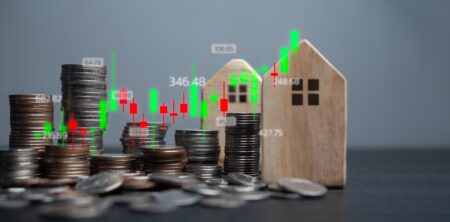
Love it or hate it, technology has revolutionised the way that most businesses operate – including those in the property management sector.
The role of the landlord or letting agent has changed a lot since the advent of the internet, smartphones, and, more recently, AI. Gone are the days of filing cabinets overflowing with receipts and invoices and answering machine messages awaiting replies. Digital-savvy property managers now use software and technology to streamline their operational processes and improve the level of service they offer their tenants.
It’s becoming increasingly important that landlords who have perhaps shied away from technology embrace it to remain competitive in the market. After all, Millennials and Gen-Z make up most of the workforce today, and these digital nomads have come to expect higher levels of efficiency and convenience from the businesses that they interact with.
If you manage property, are you harnessing technology to the best of your ability? Could you use technology to improve your rental business’s performance or improve tenant experience?
In this article, we explore the various technologies that landlords and letting agents use to improve their operational efficiency and boost tenant satisfaction. How many of these can you tick off? And which are you yet to implement? Let’s find out.
How are landlords and letting agents leveraging technology?
Landlords and letting agents should incorporate technology to streamline their daily operations, boost efficiency, and enhance the service they offer tenants. Here are a few technologies they can use to achieve this.
Expand reach with online property rental marketplaces – Online property marketplaces like Rightmove, Zoopla, OpenRent, and OnTheMarket are the most popular platforms for advertising properties to rent. These platforms are popular for good reason. They are very user-friendly, making it easy for property managers to create and post dynamic property adverts online and reach a very wide audience. Using online property websites like these helps landlords fill vacancies faster to reduce void periods and the associated financial losses.
Boost visibility further with social media marketing – Landlords who want to amplify their reach further can leverage social media to market their rental property. Platforms like Facebook and Instagram can be used to boost your property’s visibility online and engage with potential renters. Social media marketing can be particularly beneficial if you manage property that is targeted at younger demographics who are more active on social media, such as students and young professionals. If you want to gain visibility with a particular demographic, social media PPC ads can help you reach hyper-targeted audiences.
Work more efficiently with property management software – Property management software like Landlord Vision helps ease the financial and administrative burden of managing rental property. It is specialist software designed to help digitise, automate, and streamline many elements of managing rental property. Gone are the days of manual record-keeping and filing cabinets overflowing with receipts, contracts, and invoices. Instead, property management software is used to digitise, store, and organise data and documents securely and remotely online.
Property management software can be used to:
- Track and manage income and expenditure.
- Keep track of rent arrears.
- Scan in and record data from receipts and invoices.
- Produce tax reports quickly.
- Manage loans and mortgages.
- Store important property and tenant information.
- Set reminders for property management tasks and deadlines.
Using property management software allows landlords and letting agents to work more efficiently and save time and resources by automating and streamlining administrative tasks. It also helps to store all their data and documents securely online, where they can be accessed remotely from any location with an internet connection.
Speed up payments with online payment systems – Cheques are a relic from the past, and any landlord still using them risks inconveniencing tenants and looking like they’re stuck in a time warp. Online payment systems like Stripe, PayPal, and Venmo are secure and have helped landlords speed up the payment process, improve cash flow, and decrease late rent payments.
Increase convenience with digital lease agreements—Traditionally, landlords and tenants would need to meet in person to sign the lease agreement, and then each party would receive a paper copy of the signed lease. Now, many landlords have switched to electronic leases, which can be viewed and signed electronically online. This change is convenient for both parties as it means they do not have to take time out to meet in person or send emails back and forth. It is also an eco-friendly, paperless strategy.
Reduce your carbon footprint with paperless property management – Keeping track of and organising large amounts of paperwork is a logistical nightmare. Technology has allowed landlords and letting agents to go paperless with ease. Software and apps can and should be used to store and manage tenant information and data securely and efficiently. Technology makes it easy for landlords to automate the management of important information and quickly and easily search for and retrieve the information they need when they need it.
Maximise your revenue with data analytics – Thanks to technology, landlords can now use data analytics to gain valuable insights into tenant behaviour and preferences, as well as industry trends. This information can be used to make more informed business decisions, anticipate market changes, reduce void periods, boost their property’s appeal, and, ultimately, maximise revenue.
Save time with online tenant portals – Landlords can implement online tenant portals to significantly reduce the number of telephone and email queries they receive. The features offered by online tenant portals vary from one service to the next. However, most portals allow tenants to access important information about their property, lease, and payment history, make payments, submit maintenance requests, and communicate with their property manager, all through one centralised system. This streamlines communications and ensures that all interactions are logged and managed efficiently, improving response times and tenant satisfaction.
How has technology enhanced the tenant experience?
While technology has made the role of the landlord more streamlined and efficient, it has also greatly enhanced the tenant experience. Technology has made the process of finding and living in a rental property more accessible, convenient, and secure than ever. Let’s find out how.
Efficient property search – User-friendly online platforms like Zoopla and Rightmove have revolutionised the way that tenants find rental properties. These marketplaces make it easy for tenants to quickly search through a huge number of rental properties and filter the results to find properties that match their criteria.
Dynamic property listings – Technology has also made it easy for tenants to view properties in detail without leaving the comfort of their homes. Video walkthroughs and virtual tours offer a dynamic and engaging way to view rental properties online from anywhere in the world. This gives prospective tenants a clear idea of whether a property is right for them before they schedule an in-person property viewing, preventing wasted time for both parties.
Diverse communication channels – Modern technology offers tenants more channels than ever for communicating with their landlords or letting agents. In addition to traditional methods like telephone and email, tenants may also be able to communicate with the landlord through text messages, messaging apps like WhatsApp, video call platforms like Zoom or Teams, or even social media, allowing them to choose a channel that best caters to their lifestyle and preferences.
Increased autonomy – Tenant portals are as convenient and time-saving for tenants as they are for landlords. Allowing tenants to access information regarding their payments and lease autonomously online improves convenience and boosts tenant satisfaction.
More comfortable, secure, and energy-efficient rental properties – Many landlords are now integrating smart home tech into their rental properties to boost sustainability, security, and tenant comfort and satisfaction. By integrating a smart thermostat, energy-efficient lighting, renewable energy sources, and more efficient appliances, landlords can reduce their property’s carbon footprint and offer tenants attractive features like remote control of their heating and lighting and lower energy bills. Additionally, installing video doorbells and security cameras that allow for remote monitoring can enhance tenant safety and security and provide greater peace of mind.
Round-the-clock support – Implementing AI-driven communication tools like chatbots and AI assistants can provide tenants with round-the-clock support. This can enhance customer service by providing fast responses to common issues and questions to improve the overall tenant experience.
Are there any drawbacks to implementing property management tech?
While embracing digital technology and tools can offer many benefits, landlords should also be aware of the potential challenges and drawbacks before integrating technology into their business strategy.
One important issue to consider is the digital divide. Landlords must recognise that not all tenants have equal access to the technology needed to benefit from property management technology. Those without smartphones or internet access may struggle to find properties that are only advertised online or communicate with the landlord outside of traditional methods. Therefore, landlords must make provisions to ensure accessibility to all to avoid creating inequalities.
Another key concern for landlords is the cost of implementing new technology. The initial cost of purchasing or setting up new technology like smart home tech or software can be quite expensive, particularly for landlords who are only managing one buy-to-let. Depending on the complexity of the tech that you’re integrating, there may also be a learning curve when adopting the new technology. Larger rental businesses may need to spend time or resources teaching staff or tenants how to use new technology or systems effectively.
Landlords should also remember that technology is not always reliable. If you rely heavily on technology to run your rental business, then any system outages or software bugs could significantly disrupt normal operations. Additionally, landlords must invest in robust security measures to protect against hacking, phishing scams, and other cyber threats if they store sensitive information online. Any data breaches could lead to legal repercussions and damage their reputation.
What’s next for property management tech?
Technology seems to be advancing faster than ever before, so there is no doubt that there will be more changes on the horizon. We’ve done some reading to discover key trends and technological developments that are expected to shape the future of property management; here’s what we discovered.
The Internet of Things (IoT) is set to become more sophisticated and interconnected, and landlords and letting agents should expect to see increasingly integrated systems being developed. This may include smart building management systems that not only monitor but also automatically adjust lighting, heating, and security based on real-time data and usage patterns.
As we deepen our understanding of artificial intelligence and machine learning, we expect it to play a bigger role in automating property management tasks in the future. These technologies can analyse vast amounts of data to make highly informed decisions much faster than any human could. In the future, perhaps we’ll see them used to automate tasks like tenant screening, rent pricing adjustments, and scheduling predictive property maintenance.
As the UK creeps closer towards its deadline for hitting net zero emissions, we also expect to see an increase in the adoption of energy-efficiency technology in rental properties. This could include technology to reduce energy consumption, water usage, and waste.
Integrating new technology into your business strategy is no longer optional; it’s essential if you want to stay relevant and run a thriving rental business. Embracing technological advancements will not only enhance the appeal of your property to prospective tenants but also ensure your business remains competitive in a fast-evolving market. From increasing operational efficiency to creating a more convenient service and comfortable living environment for tenants, technology is transforming the rental sector for the better, offering benefits to both property managers and tenants alike.



